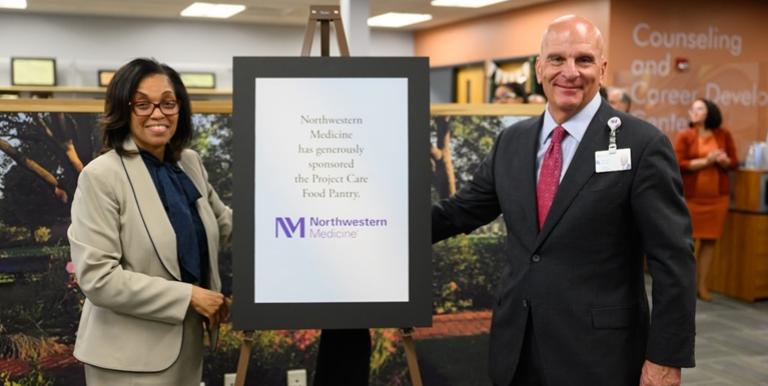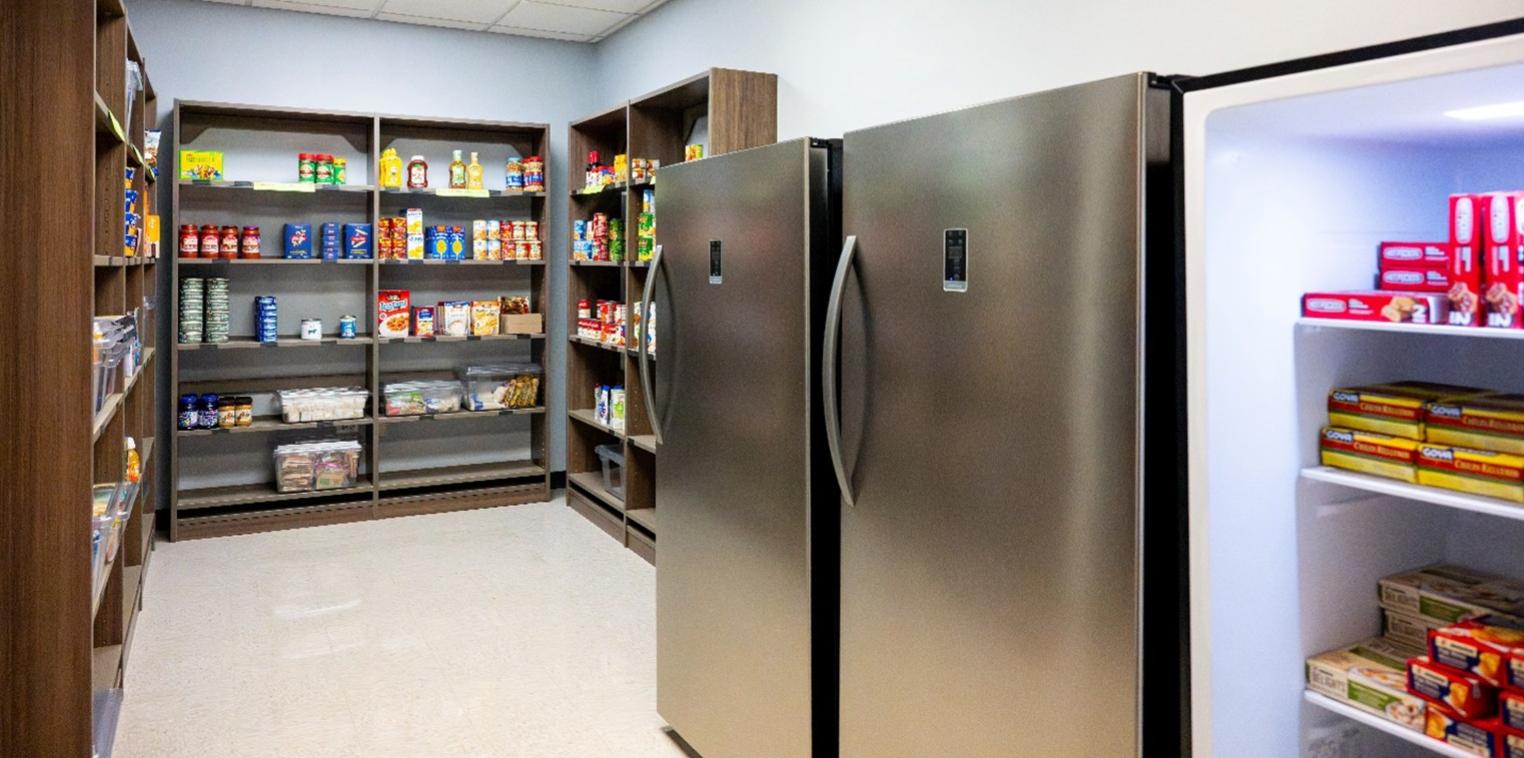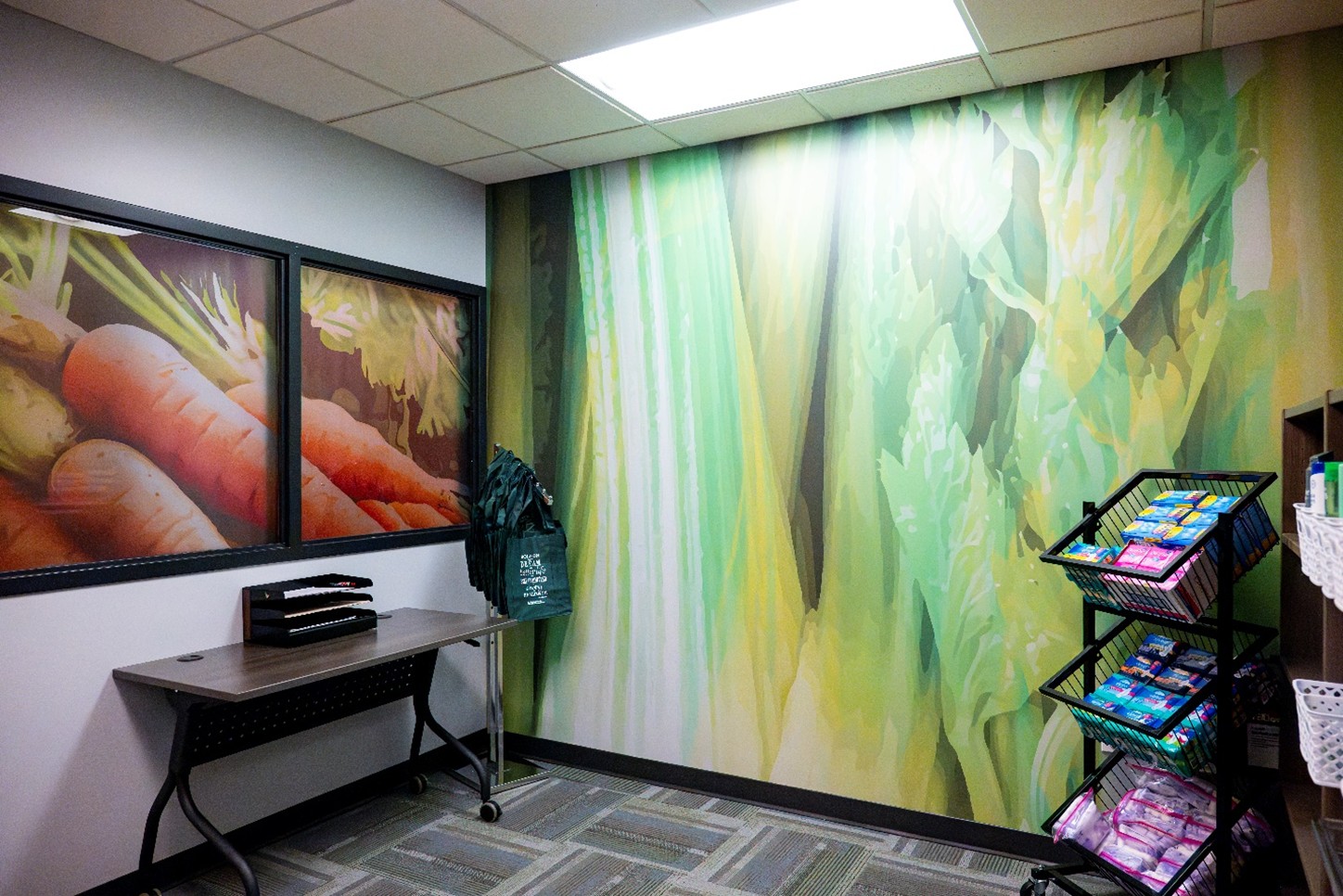Moraine Valley Community College’s Project Care Provides Holistic Support for Students in Need

Moraine Valley Community College is committed to providing students with the resources they need to be successful. Understanding that students cannot accomplish their educational goals if they face challenges in meeting their basic needs, the college developed the Project Care initiative, which offers an array of wraparound services and resources to help them meet those needs, ultimately allowing them to better focus on their education.
According to Teresa Hannon, a counselor at the college’s Counseling and Career Development Center (CCDC), the initial focus of Project Care was the campus food pantry, established in 2015. However, as staff and faculty saw an increase in related needs, the initiative expanded to aid students in additional areas.
Food Pantry Expands to Better Serve Students
The college shifted oversight of the food pantry to the CCDC in 2016 because counselors were often the frontline staff helping students with meeting basic needs concerns. When students come to get food, they are asked to complete an intake form. If they indicate they may be facing issues in addition to food insecurity, a counselor will reach out to ensure that all their needs are being met. Counselors share information about the campus resources available as well as resources outside the college that can meet their specific needs.
For many years, the food pantry was stocked with food purchased through a portion of the Student Life Office’s budget and with donations from staff, student clubs, and classes that collected food for community service projects. Although the CCDC manages the food pantry, it previously was housed in a storage room in the Academic Advising Office. As the number of students visiting the food pantry increased, the small space was no longer ideal.
In 2021, Northwestern Medicine reached out to Moraine Valley with the intention of building a strong ongoing relationship with the college. After learning about the campus food pantry and the college’s desire to expand it, Lori Mazeika-Myre, Director of Community Affairs at Northwestern Medicine Palos Hospital, encouraged Moraine Valley to apply for one of Northwestern Medicine’s Community Benefit Grants.
Every three years, hospitals in the Northwestern Medicine health care system conduct a community needs assessment by surveying external and internal stakeholders in their community to determine the health needs of that area. One of the needs identified in Northwestern Medicine Palos Hospital’s 2022 report was food access to combat food insecurity, so Moraine Valley’s food pantry expansion aligned with the hospital’s goals.
The college received two grants totaling $70,000 from Northwestern Medicine to cover the cost of construction, equipment, supplies, and marketing associated with expanding the food pantry. Northwestern Medicine Palos Hospital President Mike Vivoda stated that the hospital is proud to support Moraine Valley’s Project Care initiative:
We stand committed to partnering with local organizations to help improve the lives of our residents, and we look forward to additional collaboration opportunities with Moraine Valley Community College to ensure that basic living essentials for those in need are met.
The Moraine Valley Foundation, under the leadership of Executive Director Kristy McGreal, coordinated with Northwestern Medicine to manage the distribution of funds and equipment purchases. McGreal has worked with Dr. Scott Friedman, Dean of Student Engagement, to build out the space. Friedman said,
It has taken a lot of collaboration through the Moraine Valley Foundation and so many of our partners on campus and out in the community to expand the scope of Project Care as we assist students with food, financial emergencies, and other services that help them remain engaged and enrolled. [McGreal] and I knew that Northwestern Medicine had a focus on reducing food insecurity in the community, so we could not have been linked with a better partner to help make this project a reality.
With the financial support the grants provided, the Project Care Food Pantry moved to a larger, more convenient space in the CCDC. A storage room and office were converted to provide sufficient space for sorting and storing food. In addition to shelves for nonperishable food items, the pantry now has two refrigerators and a freezer, which allows the college to expand the types of food it can provide to students. The addition of cold storage enables the college to become a member of the Greater Chicago Food Depository and, as a result, to eventually become a community-based food pantry. “I’m looking forward to expanding the types of items we can offer students and, in the future, our community. We can now offer fresh produce, frozen food, meats, and dairy items,” said Jessica Contreras, Director of Counseling and Holistic Student Support.

The Project Care Food Pantry offers students a wide array of food options.
Contreras noted that the college also focused on making the food pantry a welcoming place. Food pantry project leaders worked with the college’s Marketing and Communications department to design a space where students and community members would feel comfortable. When people enter the food pantry, they see large, abstract murals that depict healthy foods, such as carrots and celery, and images of the campus grounds.

Bright images frosting the windows and covering the walls of the food pantry provide a welcoming experience and privacy for students while they access food during a visit.
Dr. Pamela J. Haney, Moraine Valley Community College President, said the pantry is a critical resource on the campus for hundreds of students. She noted that in the previous year, students accessed the food pantry 178 times, and that there has been a 40 percent increase in visits during the fall 2024 semester compared to the same time period last year. She said,
Results of a post-visit survey indicated that 69 percent of visitors reported not having enough food in their household most or some of the time, and half said they were unable to eat before arriving on campus due to a lack of food in their house. While it’s unfortunate that many of our students need this critical food assistance, we are fortunate to be able to help them in their time of need.
Peer Educators Make Students Feel Comfortable
Currently, Hannon and another CCDC Counselor, Shanya Gray, oversee the food pantry, along with Peer Educators Yara Khazneh and Samar Mohamed, who help keep it organized. Khazneh and Mohamed are student employees who received training in preparation to serve as peer educators so they can assist students who need to access the food pantry and encourage them to use other support services. Khazneh said,
Our job is to let students know about the resources we have on campus available to them at no cost because not everybody knows about them. We tell them about the food pantry, career counseling, and academic counseling. If we, as students, take advantage of the resources on campus, we’ll be able to navigate our lives better.
Mohamed added,
I think our role as Peer Educators is to make other students feel like they’re always welcome here and to understand their feelings, because sometimes students are not ready to tell counselors they’re struggling. I tell them not to be ashamed. I use myself as an example and tell them I’ve sometimes needed to take food from the food pantry. Sometimes when they hear that, they are encouraged.
Khazneh and Mohamed also are responsible for taking an inventory of the food in the pantry each week, removing items that have expired, replenishing supplies, and letting the counselors know what items need to be purchased. They also explain the procedures to students when they arrive, sharing that they can visit the pantry once a week and fill one bag with a specific number of items in various food categories. This ensures that there will be a sufficient stock of food for everyone.
The pair also lead a peer-to-peer discussion group covering topics such as mental health, alcohol, and wellness, and attend campus events with counselors to let students know about the resources available to them through the CCDC. These students believe the Project Care initiative demonstrates that the college is committed to helping students.
Additional Resources
In addition to ensuring that students dealing with food insecurity have the resources they need, the Project Care initiative focuses on other challenges some students face while at Moraine Valley. Hannon noted that providing emergency financial assistance also has been a longtime aspect of this initiative. “Initially, it was called Dreamkeepers, and it was a grant through Walmart. When that ended, the Moraine Valley Foundation continued supporting students in need for unexpected expenses. This assistance relieves some of their stress about finances,” she said.
Some unexpected situations have included students who:
- Needed a car repair but didn’t have money for it, which prevented them from getting to campus for classes;
- Didn’t have a car and lacked the funds to buy a bus pass to attend classes;
- Lost their job and needed money for rent or utility bills; and
- Faced unpaid medical bills without the financial resources to pay them.
The Moraine Valley Foundation purchases gift cards to meet many student needs and, if necessary, mails payments directly to landlords or utility companies. McGreal stated,
We are deeply committed to the Project Care initiative and are proud to raise the funds to support it because the programs under its umbrella, like student emergency assistance and the food pantry, offer a critical lifeline to students facing hardships.
Moraine Valley’s faculty and staff members often refer students in crisis to the CCDC so they can get needed assistance. Services are available to current students, including those enrolled in Adult Basic Education and high school equivalency courses. Hannon noted that Project Care relieves an enormous amount of stress for struggling students as they navigate classes, figure out where they’re going to live, what they’re going to eat, and how they’re going to pay for things. “I’ve had students in tears when they’ve discovered we have these services. It’s very powerful,” she said. Friedman added,
Project Care is designed to help close the gaps that make education and everyday life possible for our students in need. It is a critical resource to help them through temporary financial emergencies and to keep them enrolled to pursue a career that will provide them lifelong financial stability.
President Haney expressed her gratitude to the counselors and others who support the Project Care initiative:
Helping students with difficult issues such as hunger and homelessness is not an easy task, but they truly care about our students, and I’m grateful for the work they do every day. We know education is not just about classroom learning but creating an environment where our students find success in every aspect of their lives. Our students know that they have people at Moraine Valley who are in their corner, and that can be a relief during difficult times.
Lead image: Dr. Pamela J. Haney, President, Moraine Valley Community College, and Mike Vivoda, President, Northwestern Medicine Palos Hospital, celebrate the new Project Care Food Pantry opening.
Karen Town is the Communication Specialist at Moraine Valley Community College in Palos Hills, Illinois.
Opinions expressed in Innovation Showcase are those of the author(s) and do not necessarily reflect those of the League for Innovation in the Community College.










